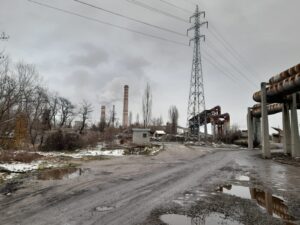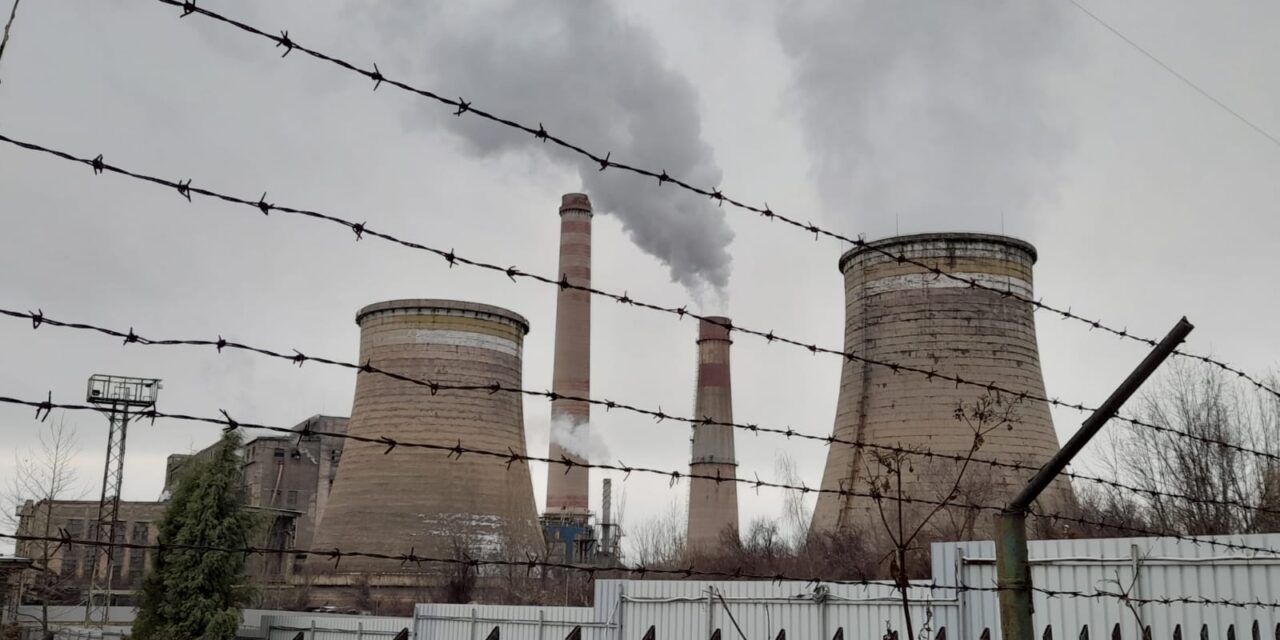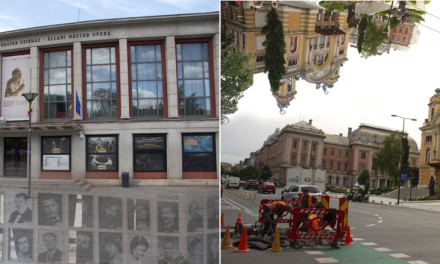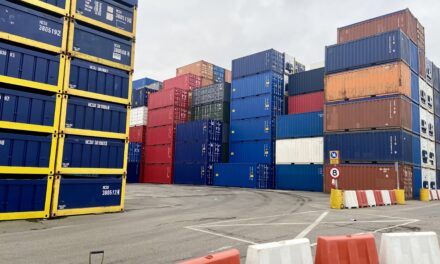It is a cold winter day in Pernik, a town some 20 kilometres away from Sofia. The snow is already on the ground. Although, with the temperature just above freezing, it is beginning to look more like mud. But the snow showers have already left the city. The biggest clouds that can be seen, are the exhaust fumes from the power plant. The giant chimneys of the plant overlook the town, which, with a coal mine and power plant, is responsible for a large part of Bulgaria’s energy supply.
Such an important player in Bulgaria’s energy supply, but there is not much to see around the power plant. It is within the walls of the plant where the activities take place providing power to millions of Bulgarians. Outside, it is just colourless and deserted, just like almost every power plant. But it may not be long before the inside of the power plant looks just as deserted as the outside. Since Bulgaria has a major coal problem.
Bulgaria, like every other EU country, is obliged to phase out coal completely by 2050. Time enough, you might think. But this may also lead to a lack of commitment to create plans to make this energy transition as smooth as possible.
And that is exactly what is happening…
It took a very long time before the Bulgarian government had a phase-out date at all. Which means Bulgaria is in danger of digging its own grave.

Coal power plant in Pernik
Bulgaria`s relationship with coal goes back a long way. With Pernik being the heart of the coal industry since the Second World War.
“Coal is the only domestic power source Bulgaria has. Literately the only power source apart from water” says Ivan Paspaldzhiev, senior consultant at Denkstatt, the leading energy consultant in Bulgaria. “Right now, coal present 30-40 percent of the energy supply in Bulgaria.”
It explains why in a country like Bulgaria, with less than 7 million inhabitants, there are several coal mines. These were mainly underground mines. But for various reasons, Bulgarians have increasingly switched to open pit mining. With as yield, a different type of coal: lignite.
“Underground mines have a better quality. But it takes more effort to dig it, it`s more dangerous & expensive and the coal started to get exhausted. Now we have shifted mostly to open pit mining that dig lignite.” Says Meglena Antonova, programme lead at Greenpeace Bulgaria. “That is a type of coal with a much worse quality. There is a lot of moist, ash and sulfur in it with not a lot of calories in terms of values. That`s why there is so much emission of sulfur and dust in the country.”
“Keep in mind that lignite is the worst form of coal in terms of pollution. It`s the least energy dense and the most dirty. So you get the least amount of energy per year per pollution. But it`s still the only domestic source we have.”
– Ivan Paspaldzhiev
With an extremely polluting energy source and the climate crisis in the picture, it seems inevitable that Bulgaria will try to phase out this energy source. However, this is not as easy as it seems, and there is a lack of a proper strategy to phase out coal. Why is that?
First of all, there are the technical aspects of the problem. Ivan Paspaldzhiev: “Bulgaria had bad experience with renewables. We have a very old grid. And the sun doesn`t shine a lot during the day but then the windmills are there in the night when there is less demand. And the balancing of load is very difficult. There is too much energy to go around at all the wrong times of the day. So the grid can’t keep up. And this leads to difficult situations in the energy prices and in the grid.”
“So we don`t know what else to put in there. Even though Bulgaria has a huge technical capacity in renewables development. Our engineers are doing renewables all over the world. It`s more like, how do we get the energy exactly when we need it. Also on cold days, all your solar panels are covered in snow, so there is nothing coming in. Okay maybe the windmills are turning, but is that enough? And is it at the right time? Also during the night? These sort of things. And it’s a fact that very large battery storage aren`t very well developed either”
– Ivan Paspaldzhiev
To add to this. Meglena Antonova thinks that administrators overlook the small projects: “When they talk about renewables they always talk about the very big projects. Smaller things like people created their own energy, all these thing are considered as cosmetic. You actually have this huge potential of people producing their own electricity and reducing the overall demand you have in the country. Our biggest consumption is in the winter, when we don`t use energy efficiently, we use it for heating but not with an efficient heat pump for example. A lot of people in Bulgaria heat their homes with this super ineffective heaters. Unfortunately it’s a waste of energy. This is something which is not addressed.”
The future of renewables is uncertain in Bulgaria. As a result, other options may be considered. But the question is whether there is really a proper solution among them. Paspaldzhiev: “So we can use more and more renewables. We know how to do that, but then we don’t have enough electricity when we need it. And either we get more gas from Russia, which isn`t very nice because, historically, Bulgaria is at this crux of former Russian interest from the Soviet times and now pro-west, pro-EU, pro-NATO and there is always this political tension. Or we put a gas plant there. But is that green or not? Is it allowed? The EU has these whole directives whether gas should be seen as green or not. These sort of things are in an open political issue.”
It was also a big political issue if we should have another nuclear power plant. Most people said no because it cost too much and because it was more about the peak demand that we were worried about.”
– Ivan Paspaldzhiev
To summarise, if Bulgaria wants to replace coal with renewables. The question is whether there will always be enough energy at the times when it is most needed. Getting gas from Russia may raise diplomatic issues as Bulgaria wants to break away from historical Soviet influence and become a pro-EU & pro-NATO country. With gas, the question is whether it is green and legal. And people think nuclear energy is too expensive and it is questionable whether it helps with the peaks in Bulgaria’s energy demand, since this is one of the main concerns.
These are all various possibilities, all with their own difficulties. But at least there are different options. However, none of these options offer a solution to the biggest problem that has not yet been addressed: job losses.
In the regions where there is a coal mine or coal power plant, these are the biggest job creators. And not only that, for people in these regions, a job in the mine or plant is a sign that you have made it.
“Those mines and plants there are the biggest employer in the region. People in that region, when they are growing up, they are told like: ‘oh I hope you get a job in the plants’. That`s a social thing, if you are in the plants, you are set. Also you get some pretty good money.”
– Ivan Paspaldzhiev
All possible alternatives to coal do not solve this problem. Since renewables, gas & nuclear energy do not simply provide people working in the coal sector with a new job, this creates a lot of pressure from miners and plant workers. And politicians feel this pressure.
For example, in 2012, there were large protests because the Bulgarian government wanted to raise energy prices. It was so bad, that a protester set himself on fire and died. These protests led to the prime minister resigning due to the public pressure. Which makes politicians very afraid that if they decrease the number of jobs in the coal sector, the same sort of protests will arise.
This creates this impasse in which the Bulgarian government has to phase out coal in view of the climate crisis. But it does not want thousands of jobs in the coal sector to disappear, protests to arise, and their political careers to be put at risk.
Nevertheless, there are several plans to compensate for the job losses associated with the coal phase out. But like any possible solution in this issue, there are several problems that come along with it.
For example, there is the idea of retraining miners and power plant workers to be an employee of other energy sources like a technicians for a solar park. But…
…A job in a mine or a power plant is something that people in these regions are very proud of and will not let go of easily.
…Confidence in the government is extremely low in Bulgaria. This means that these people do not simply believe politicians who say that they will get a new, well-paid job.
This becomes even more apparent when looking at neighbouring Romania. There, retraining programmes are applied for miners and power plant workers. Something Bulgaria does not dare to start with. And when looking at the trust in the government in Romania, it’s also higher than in Bulgaria.
Nevertheless, there are economists who have calculated that such a retraining should be feasible in Bulgaria. But according to Ivan Paspaldzhiev, that does not say everything: “There are all these analysis about how renewables will get new jobs and reskill the people and it will be fine. All of these analysis are based on economic models and are in theory correct. But the gap between the analysis and the actual fact is how do you reskill these people effectively. There is no economic model which is going to tell you that we need to reskill x amount of people and will actually tell you how to do that. How do you reskill these people? How do you make them sign up? How do you put them in a new job? Imagine a guy who is working in the mine for 15 years. What is he going to do? How do you reskill those people? The actual fact of the matter is difficult.”
All these complicated issues, but a lack of proper proposed solutions have made it appear as if this problem only emerged a few months ago. But the reality is that the Bulgarian government has known for years that this is a big problem. But pressure from workers and the ample time Bulgaria had to phase out coal have led politicians to postpone tackling this problem in order to prevent unrest in the country and protect their political careers.
“I haven`t seen any proper proposed solution. I was looking at a map of funded projects in Europe and there were zero in Bulgaria.” “All these political issues create a very toxic environment. Nobody wants to make a big move.”
– Ivan Paspaldzhiev
“Our main worry is that if people are going to push decisionmakers to promise to not close the powerplants and the mines. At some point, it will become inevitable and we don`t have a proper strategy.”
– Meglena Antonova
In the end, Bulgaria did have to declare a coal phase-out date to the EU. Because otherwise it would not receive money from the European Commission for its energy transition. The money that Bulgaria desperately needs.
In 2021, the Bulgarian government informed the European Commission that it would have phased out coal by 2038 or 2040. But how will they do that if there are no concrete plans yet?
An additional problem (as if there were not enough of them already) is that some of the power plants are not state-owned. This makes it more difficult for the government to control exactly what happens. These private-owned power plants claim to need public money to help implement sustainable measures. Something Meglena Antonova does not agree with: “We as an organisation are very much convinced that if you used to be a polluter, the state should not give you money to become cleaner, you are the one that have been polluting, you should pay for the pollution that you have caused.”
So how will Bulgaria resolve this? There are several alternatives to coal that could provide Bulgaria with energy. Each alternative has its own advantages and disadvantages. But they do make it possible to stop being dependent on coal by 2040. The main question is how the loss of jobs in the coal sector will be compensated. Especially since the Bulgarian government could not rely on the support and trust of the population.
The next three years will be interesting. That is the length of the term of the new Bulgarian government that was sworn in last December. With ‘We Continue the Change’ as the largest alliance in the coalition. This alliance (consisting of three parties) was founded in September, after a political crisis, with the aim of stopping corruption in Bulgarian politics.
Ivan Arseniev, a former employee of the Maritza-East mines, saw how the corrupt government was replaced last year by a new impetus. Something that Ivan and many Bulgarians look forward to with hope:
“There was a lot of distrust in the previous corrupt and incompetent government of Boyko Borisov. The current government of Kiril Petkov has been in place for a few weeks and currently enjoys good support. It is made up of young and ambitious educated people. None of the ministers was educated in the repressive militia school of the Communist Party, as was the previous Prime Minister.”
– Ivan Arseniev
The question is whether the new government can win back the trust of the Bulgarian people. If they managed to do that, the government can more easily convince its people that they will create new jobs, which will make the transition and the realisation of measures way easier. Arseniev: “The only thing that can be done is for the government to look after the national interests of the country, to govern in a way that creates jobs and not to plan for job losses.”
So it will be interesting to see what plans the government will create to provide jobs for miners and power plant workers. But those plans must come soon, otherwise, it will be a race against the clock.




